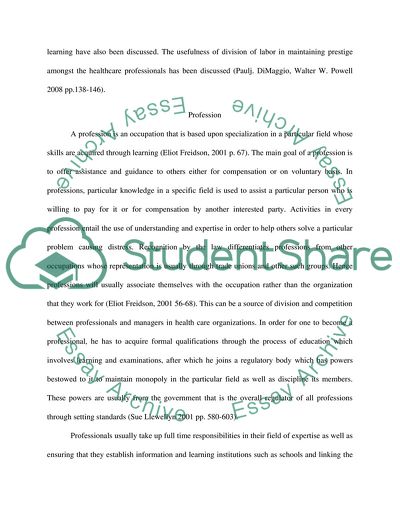Cite this document
(“Organizational Learning: A Significant Aspect in the Healthcare Essay”, n.d.)
Organizational Learning: A Significant Aspect in the Healthcare Essay. Retrieved from https://studentshare.org/health-sciences-medicine/1552422-paradoxically-organizations-that-are-dependent-on-expert-knowledge-are-unlikely-to-promote-organizational-learningcritically-evaluate-this-statement-in-relation-to-healthcare-organizations-using-the-sociology-of-professions-and-see-attachment
Organizational Learning: A Significant Aspect in the Healthcare Essay. Retrieved from https://studentshare.org/health-sciences-medicine/1552422-paradoxically-organizations-that-are-dependent-on-expert-knowledge-are-unlikely-to-promote-organizational-learningcritically-evaluate-this-statement-in-relation-to-healthcare-organizations-using-the-sociology-of-professions-and-see-attachment
(Organizational Learning: A Significant Aspect in the Healthcare Essay)
Organizational Learning: A Significant Aspect in the Healthcare Essay. https://studentshare.org/health-sciences-medicine/1552422-paradoxically-organizations-that-are-dependent-on-expert-knowledge-are-unlikely-to-promote-organizational-learningcritically-evaluate-this-statement-in-relation-to-healthcare-organizations-using-the-sociology-of-professions-and-see-attachment.
Organizational Learning: A Significant Aspect in the Healthcare Essay. https://studentshare.org/health-sciences-medicine/1552422-paradoxically-organizations-that-are-dependent-on-expert-knowledge-are-unlikely-to-promote-organizational-learningcritically-evaluate-this-statement-in-relation-to-healthcare-organizations-using-the-sociology-of-professions-and-see-attachment.
“Organizational Learning: A Significant Aspect in the Healthcare Essay”, n.d. https://studentshare.org/health-sciences-medicine/1552422-paradoxically-organizations-that-are-dependent-on-expert-knowledge-are-unlikely-to-promote-organizational-learningcritically-evaluate-this-statement-in-relation-to-healthcare-organizations-using-the-sociology-of-professions-and-see-attachment.


